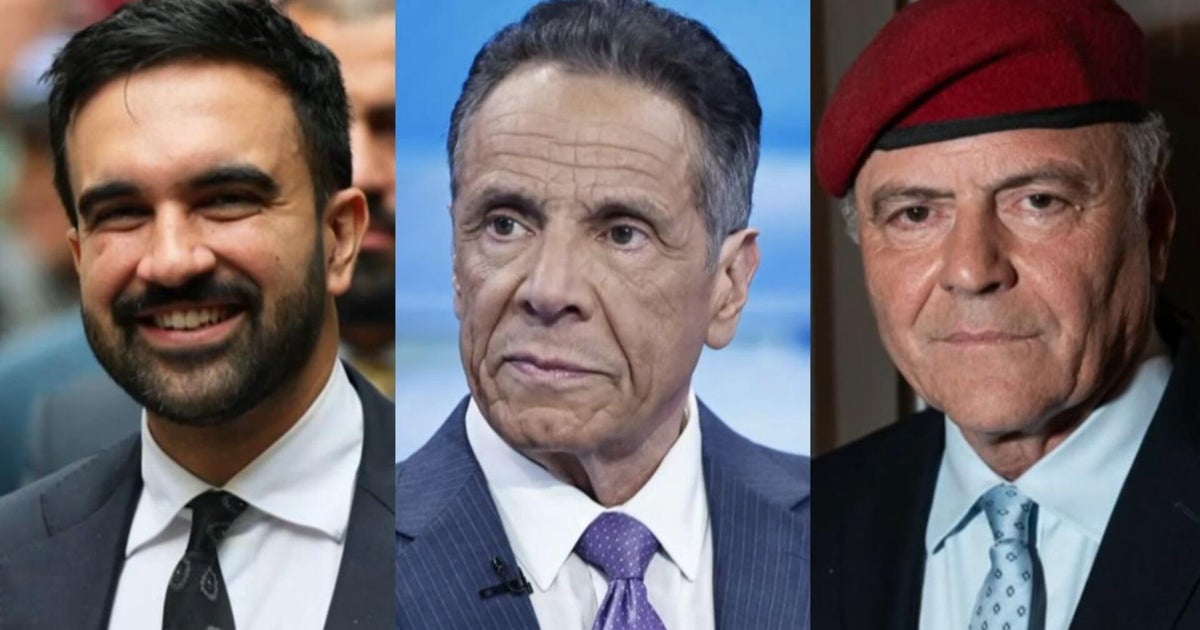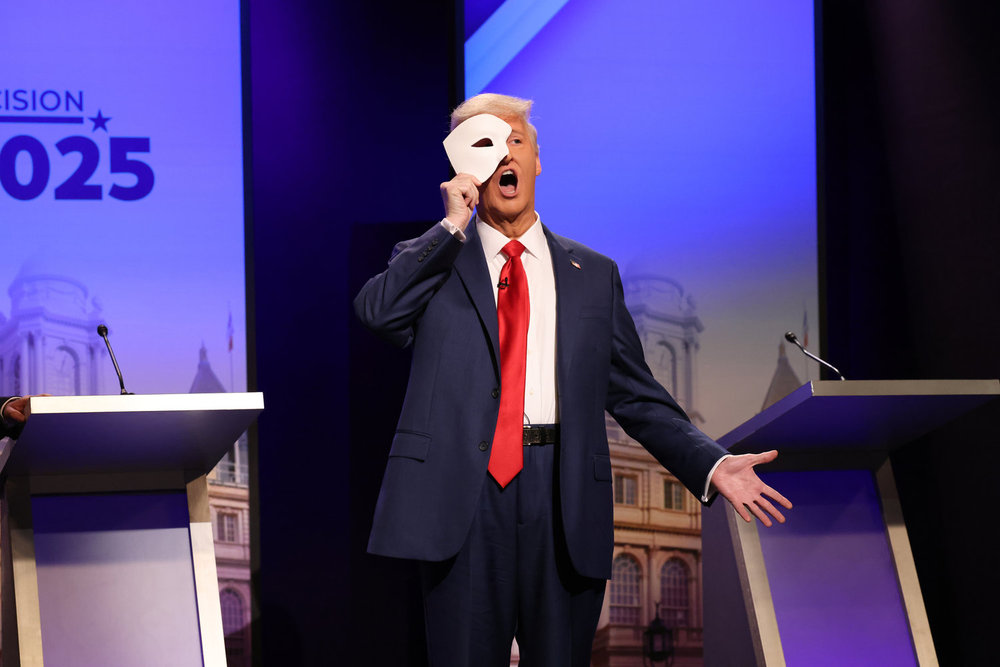New York
—
Rama Duwaji isn’t playing the traditional role of a first lady in waiting.
She hasn’t stumped for Zohran Mamdani, the New York City Democratic mayoral nominee and front-runner she married earlier this year. She hasn’t done a joint television appearance or agreed to a splashy magazine profile.
And hardly anything on her Instagram page, where she promotes her artwork depicting Middle Eastern women and the plight of Palestinians, suggests that she even knows Mamdani, aside from one post on the day of the June Democratic primary.
“Couldn’t possibly be prouder,” she wrote in the caption of a carousel of photos showing the couple together, a photo of herself voting early and a photo of Mamdani as a boy.
If Mamdani wins Tuesday’s election, becoming the city’s first Muslim mayor and its youngest in a century, Duwaji too would be positioned to make and shape history. She would be the first member of Gen Z to serve as New York City’s first lady, a 28-year-old artist moving into Gracie Mansion under the relentless spotlight of America’s largest city.
While she’s skipped traditional campaign set pieces, Duwaji has been present during key moments and has advised behind the scenes on social media and campaign iconography. She tagged along as Mamdani cast his primary vote early in the day, when many observers still thought he was unlikely to beat former Gov. Andrew Cuomo, and joined Mamdani onstage when he delivered his victory speech that night.
She accompanied Mamdani to his most recent appearance on Comedy Central’s “The Daily Show.” And she was in the crowd, sitting alongside more than 10,000 people at a packed Forest Hills Stadium in Queens, to watch Mamdani make his closing argument at a rally headlined by Rep. Alexandria Ocasio-Cortez and Sen. Bernie Sanders.
It isn’t clear what, if any, official role Duwaji would have if Mamdani is elected mayor. She has declined interviews during the general election campaign, including a request from CNN for this story.
But the last several months offer some clues.

Duwaji, who is of Syrian descent, was born in Houston and lived in Texas until her family moved to Dubai when she was 9. She briefly attended the Virginia Commonwealth University School of the Arts in Qatar before transferring to the school’s Richmond campus to complete her degree. She later earned a master’s degree in illustration as visual essay from the School of Visual Arts in New York.
Her illustrations have appeared in The Cut, the BBC, Vogue and The New Yorker.
Duwaji and Mamdani met on the dating app Hinge in 2021. Mamdani had recently been elected to the New York State Assembly, something Duwaji knew little about.
Their first date would sound familiar to many of the young supporters of Mamdani’s campaign: They shared a meal at Qahwah House, a Yemeni coffee shop in Brooklyn, followed by a stroll in nearby McCarren Park. On their second date, Mamdani took Duwaji on a tour of his legislative district in Astoria, Queens.
Mamdani and Duwaji were engaged a few years later, in October 2024. Days after announcing their engagement on Instagram, Mamdani launched his campaign for mayor. They celebrated their engagement in Dubai that December, followed by a courthouse wedding this February at the city clerk’s office in Lower Manhattan. They posed for photos on the green couches of the marriage bureau’s waiting room, in front of a backdrop showing City Hall.
Several months before the ceremony, Mamdani and Duwaji discussed how his plans to run for mayor could potentially change their lives, limit their privacy and likely thrust Duwaji into the public eye, according to a person familiar with the couple granted anonymity to share private details.
Shortly after Mamdani launched his mayoral bid and questions began to swirl about the couple — “Socialist NYC mayoral contender Zohran Mamdani secretly tied the knot in exotic Dubai ceremony, photos show,” read a New York Post headline — he released their civil ceremony images on Instagram.
“Rama isn’t just my wife, she’s an incredible artist who deserves to be known on her own terms,” Mamdani wrote.
Duwaji, the person familiar with the couple said, knew what she was getting into. In the year that Mamdani has campaigned for mayor, she has been a major source of support, even if he falls asleep on the couch as they try to get through “Temptation Island” and the “Mission Impossible” series in 15- to 30-minute increments.
Duwaji helped finalize the campaign’s brand identity and worked on the final version of the campaign’s iconography and font, which showcases a distinct blend of colors easily identifiable to New Yorkers: Metrocard orange-yellow, New York Mets blue for shadow drops and backgrounds, and splashes of firehouse red. The font calls back to a time of bold-yellow bodega signs calling out to customers.

Mamdani, whose mayoral bid has been powered by his use of social media, also credits Duwaji with improving the campaign’s digital sensibilities.
He has sometimes been peppered with questions about his young marriage and the couple’s future. At a recent press conference where Mamdani was highlighting his proposal to provide newborn New Yorkers and their families with “baby baskets,” he was asked whether he planned on having any children soon.
“I feel like I’m talking to my mother,” the 34-year-old responded with a laugh, adding that for now, he is focused on the mayoral race.
Traditionally, first spouses thrust into high-profile support roles host events, back causes that complement their partner’s agenda, and keep their more controversial opinions to themselves.
Duwaji’s political views speak loudly through her art, which features black-and-white illustrations depicting Middle Eastern women, severe hunger in Gaza and the Palestinian flag. Those posts broadly align with her husband’s criticisms of the Israeli government and its conduct of the war following Hamas’ October 7, 2023, attacks, comments that have at times roiled New York City’s Jewish population, the largest outside Israel.
“What she is posting has been in line with many of the things that Mamdani has talked about,” said Lisa Burns, a professor of media studies at Quinnipiac University who has studied the role of first ladies. “I’m starting to see some of that work merging, where the advocacy work that she is doing will support the work he is doing — even if it’s separate — as opposed to detracting from it.”
In an April interview with Yung, a quarterly magazine focused on art from Africa and the Middle East, Duwaji said she creates her work “for people who care about the things I care about.”
“With so many people being pushed out and silenced by fear, all I can do is use my voice to speak out about what’s happening in the US and Palestine and Syria as much as I can,” she said.
New York City is no stranger to mayoral spouses with their own public profiles.
Mayor Bill de Blasio’s then-wife, Chirlane McCray, was a staple of his campaign and administration, providing input on staff picks and high-profile appointments. Part of de Blasio’s appeal to voters was how his multiracial family had helped shape his worldview.
A 2013 New York Times profile of McCray described her and de Blasio as being “as much a package deal as Bill and Hillary Rodham Clinton.” Political meetings were set around her schedule, and McCray sat in on key job interviews. She was assigned oversight of a mental health initiative that brought her in front of the City Council during budget negotiations.
Diana Taylor, the longtime partner of former Mayor Michael Bloomberg, was a former government official and finance executive who didn’t define herself by the role.
“Her famous boyfriend may be the least interesting thing about her,” then-Vogue editor Anna Wintour, a friend of Taylor’s, told The Washington Post in 2020 when Bloomberg was running for president. “She’s intelligent, independent — and completely her own person.”
For now, Duwaji’s presence can’t be seen by most New Yorkers, even if it is felt quietly by her husband’s campaign.
At a recent “sip and pour” event at a senior citizen center in Brooklyn intended to get out the vote, Mamdani tried to follow along as an art instructor showed the group how to draw a fall landscape.
Brush in hand and a paper plate with dots of paint as a palette, Mamdani tried to tamp down expectations.
“I have to warn you all, I’m not very good at painting,” he said, adding the last time he had painted anything was on a date with his wife. Mamdani then began to draw. Asked later about the quality of his sketch, he said, “Don’t tell my wife.”
A campaign aide had already done so, texting a photo of his attempt to draw a tree.
She fired back: “That is a triangle.”


